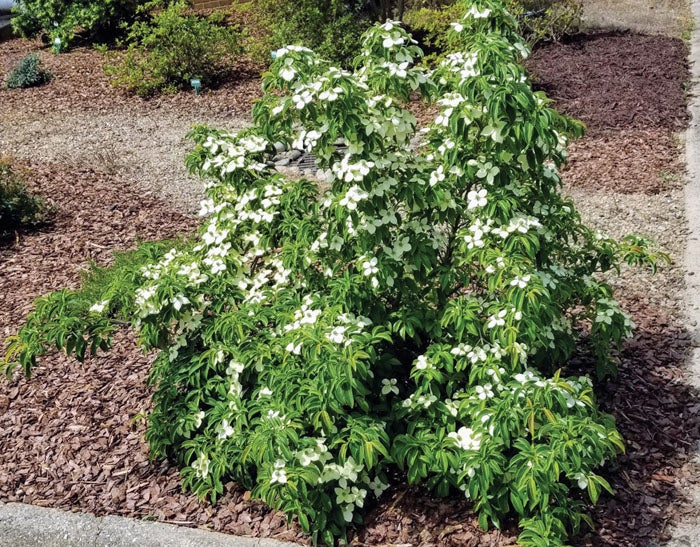Heat, humidity prompt garden questions
Published 12:00 am Friday, June 15, 2018

- Submitted photo This is an evergreen dogwood tree that blooms continuously.
Above average temperatures and high humidity are now upon us and plant problems are inevitable. Below are a few questions posed this week that may be of interest to those working in gardens and landscapes.
Question: There is a small evergreen shrub at the Cooperative Extension office on Old Concord Road that has blooms very similar to a dogwood. Can you tell me what the name of this shrub?
Answer: The plant you referring to is an evergreen dogwood tree, Cornus Angustana ‘Elsbry’ Empress of China. The small tree can produce up to 150 creamy white blooms per branch in late spring. The small tree can reach a height of 12-15 feet and has survived at this location for a couple of years.
Question: I have an apple tree in my back yard and the leaves are coated with orange spots. The spots seemed to appear all at once a few weeks ago. What is this and how can I control it?
Answer: Your tree most likely has cedar-apple rust. It is a fungus disease that occurs on both apple and cedar trees. The disease can be a problem if apple trees are planted in the general vicinity of red cedar trees. It is a disease that is almost impossible to control if you have a susceptible cultivar. There are apple cultivars which are resistant to the disease. The disease usually does not kill the tree, but it will weaken the tree and fruit quality will suffer.
Question: There are bees flying in my backyard. They look just like honeybees but they are boring in the soil. What are these bees and what can I do to control them?
Answer: Sounds like what you have is ground bees or solitary bees. These insects bore individual holes into clay soils. They look much like honey bees hovering over the soil. Unlike honeybees or hornets, they are solitary and live to themselves. They are excellent pollinators and not aggressive as are yellow jackets or hornets. However, they can be a nuisance to homeowners, especially those with severe allergic reactions or small children. If you have great fears, use an insecticide carefully. If the insecticide will kill ground bees, it will also kill honeybees and other important pollinators.
Question: My husband sprayed weed killer around the house and he accidentally sprayed some of the bedding plants we planted earlier this spring. Will the spray kill the plants?
Answer: It really depends on what was sprayed. It appears that the spray contained diquat which is a contact herbicide. A systemic herbicide like Roundup would most likely kill the plant to the roots.



